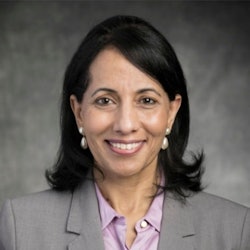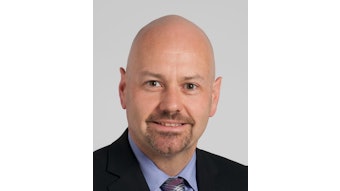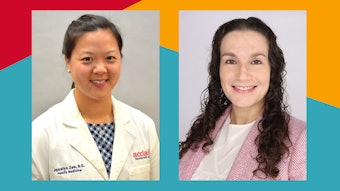Barriers, pitfalls, and myths: a framework for advancement for women in medicine
Navigating your way to a leadership role in medicine requires more than a map.

For women in medicine, getting into leadership positions is not a straightforward path. It is one beset with pitfalls, barriers, and myths that need to be dispelled and dealt with along the way.
Elham Yousef, MD, MBA, MSC, FACP, SFHM, vice president of medical affairs and associate chief medical officer at Tampa General Hospital Health System in Tampa, Florida, said while women in medicine constitute a large percentage of the health care workforce and make invaluable contributions every day, they remain underrepresented as leaders.
For professional women in medicine with high career aspirations, Dr. Yousef said the road to the top is a steep one—and perhaps a more precarious ride—mostly because of their gender.
"So how do women at various stages of their professional health care careers step into and succeed in leadership positions?” Dr. Yousef asked. “How do professional women in medicine prepare so that when opportunity arises, they are empowered to confidently raise their hands? How do professional women—and men—in medicine effectively cultivate female leadership talent in health care settings? What are the elements and tools that professional women in medicine need to successfully become leaders in their departments and organizations?”
Dr. Yousef will address all of these questions in her session “Myths About Women in Medicine: a Roadmap for Leadership and Career Advancement.”
Myth versus reality
The biggest myth for women in medicine is one they tell themselves, said Dr. Yousef.
“Sometimes you hear women doctors say, ‘I don’t have the criteria for leadership,’ or ‘I don’t think I’m ready now, maybe next time,’” she said. “This is exactly what we need to have everybody understand: it’s not a matter of ‘I don’t fit the profile or don’t have the experience.’ As you see, there is this misconception about leadership in general. It is always linked to seniority and hierarchy position in the department or the organization. There are so many definitions of the term ‘leadership’ in literature. The one that I personally like is that leadership is ‘the ability of an individual or group to lead, influence, and guide other individuals, teams, or organizations.’ It is really about having the right skills, values, and personality that allows you to earn trust and respect, build relationships, and subsequently influence and lead.”
Another myth Dr. Yousef said she hears multiple times is that women believe they don’t need a mentor and as long as they do a good job everyone will notice. This, she said, is a big mistake.
“Professional women in medicine need to understand the great value of mentors and coaches in their lives as they are working on growing and advancing in their careers,” she said. “Mentors, coaches, sponsors, and allies are critical to strengthening their foundation as well as building a network of advocates who have your best interest and can work on your behalf when you are not present. During the session, we will also talk about the difference between mentors, coaches, sponsors and allies.”
Barriers to success
The biggest barrier women can face in the workplace, Dr. Yousef said, is the workplace itself.
“This is the biggest challenge for women in medicine,” she said. “The organizations are not clear on how to support and cultivate women in leadership in the health care setting. It’s not something embedded in any health care organization strategy, and if it happens, it often comes as an afterthought. This is really one of the biggest barriers.
That’s why Dr. Yousef said it’s important for women to take full ownership of their own career growth and development. They must be intentional and strategic to be able to achieve their goals. Dr. Yousef will outline some strategies that women in medicine can employ to achieve those goals.
“Women need to understand they are not limited,” she said. “It doesn’t matter what stage they are in their career—if you are just early career, mid-career or late career—there is always something for us to do to help us continuously develop, grow, and promote.”
Dr. Yousef said one of the biggest strategies that helped her personally grow and advance was creating her own professional visions. She believes every professional woman in medicine should create one.
“Professional visions can be used as a guide that identifies short- and long-term career goals, core values, and key strengths as well as opportunities for self-growth and skills development,” she said. “It will help with clarity of the goals, as it creates a sense of clear direction and commitment.”
When it comes to professional growth and leadership, Dr. Yousef said it is important to know that it is never a straightforward path. There will always be challenges, setbacks, and failures.
“Everybody needs to understand that barriers and setbacks are going to happen, period,” she said. “It’s important for all of us to really embrace it. Don’t take barriers and setbacks personally and don’t let it affect your confidence, self-esteem, and professional image. Don’t take it as someone accusing you of being inefficient or not enough or making you feel like there is something wrong with you. Try to objectively understand what the setbacks are and reflect on what could have been done differently. It is critical to embrace failures and to have the right attitude when dealing with challenges. There will be difficult and uncomfortable conversations, and we should learn how to handle these conversations with a great deal of emotional intelligence and empathy and without burning bridges—especially during a time of mental and emotional stress. Failures are huge opportunities to reflect, learn, and grow. During the session, we will provide the audience with clear strategies for how to stay motivated and committed to their professional goals and success when facing challenges and setbacks.”
Dr. Yousef said the session will also explore the role of departments and organizations in advancing and promoting women in medicine into leadership positions.
“There are currently many policies that are negatively impacting female physicians,” she said. “They are mostly related to maternity and family leave. There aren’t enough policies that can support motherhood and caretaking in a way that would allow women to balance work and personal life.”
But that’s only one side of the equation, she said. The other side is related to promotions of women in positions of professorships and in grants.
“We will answer questions like how department chairs can become an ally and not a barrier,” she said. “What do department chairs need to actively do to advocate for women’s advancement beyond the statistics of the number of professors? Or how can department chairs influence the organization’s culture and strategy toward women in leadership? We will discuss practical steps that department chairs and organization leaders can start taking right now to actively support female promotion and advancement into leadership roles.”
Visit SHM Meeting News Central for more coverage.











